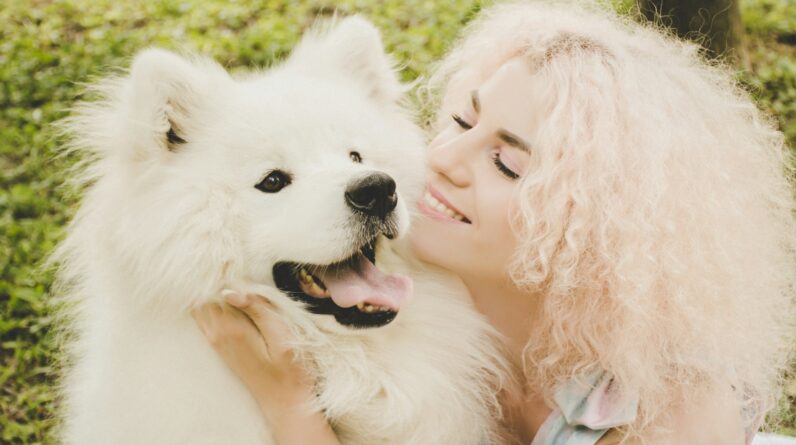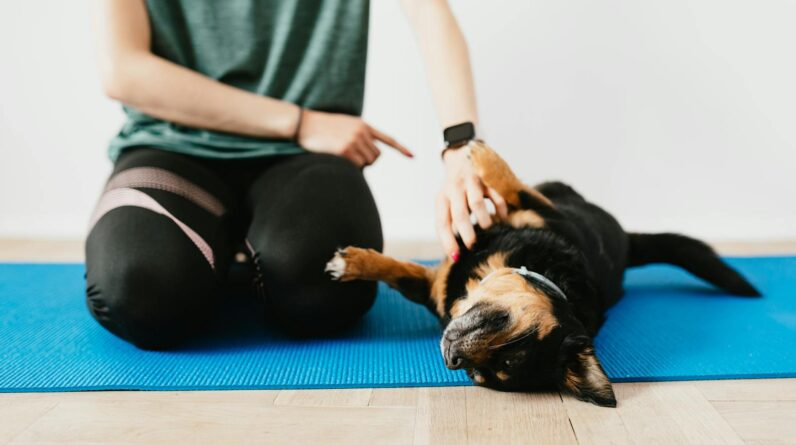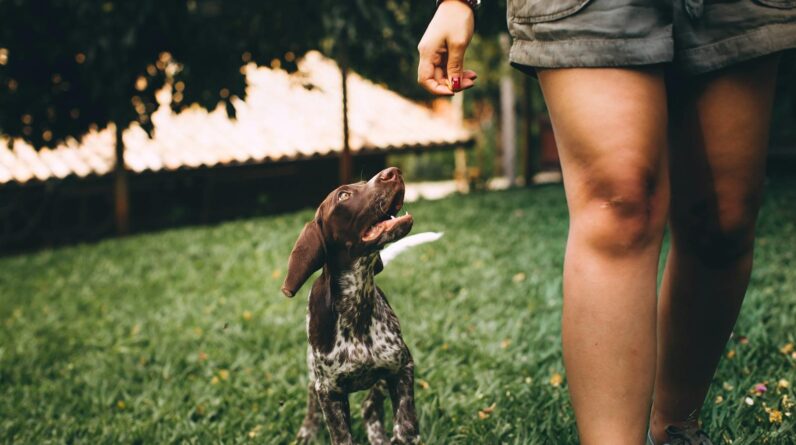
Why Dogs Get Stressed
Just like you, dogs can feel stressed too. They might get worried when there’s a loud noise like thunder or when they meet new people or other dogs. Sometimes, they miss their owners or they just don’t like being alone. When dogs are stressed, they might bark a lot, hide, shake, or even get sick.
Signs Your Dog is Stressed
It’s useful to know when your dog is not feeling great. Watch for things like your dog not eating much, looking sad, licking their paws a lot, or trying to hide. If they are doing these things, they might be saying, “Hey, I’m not feeling too good.”
Regular Exercise Helps
One of the best things you can do for a stressed dog is to make sure they get lots of playtime. Go for walks, throw a ball around, or run together in the park. When dogs get to move and have fun, it helps them feel happy and less worried.
Safe Spaces for Dogs
Think about having a special place just for your dog. It can be a cozy bed or a little house where they can go when they want to be alone. This is where they can rest and feel safe when the world gets too noisy or scary.
Keep a Routine
Dogs like knowing what’s going to happen next. Try to feed them, walk them, and play with them at the same times every day. This helps them understand that even though things change, some important things stay the same.
Training and Games
Teaching your dog how to sit, stay, or come when called is good for them. It’s like a game and it helps their brain stay busy. When dogs are learning, they don’t have much time to be stressed. Puzzles and toys that hide treats are also great for keeping their minds off things that worry them.
Music and TV for Dogs
When you’re not at home, you can leave the TV on or play some music for your dog. There are even special shows and songs made for dogs to help them feel calm. It’s nice for them to hear sounds that are gentle and happy.
Touch and Talk
Your voice and your hands are magical to your dog. Take some time to pet them and talk to them softly. This shows them you love them and everything is okay. It’s like a big, warm hug with your words and your touch.
Make Meetings Fun
If your dog gets nervous around new dogs or people, you can help them by making meetings fun. Bring treats and toys to help your dog think that meeting friends is a good thing. Go slow and let your dog say hello in their own time.
Quiet Time is Important
Just like you need a break after a long day, so does your dog. Make sure they have some quiet time every day without noise or too much going on. This helps them relax and feel peaceful.
Check Up with the Vet
If you’ve tried these things and your dog still seems stressed, a trip to the vet is a good idea. Sometimes feeling worried can be because of something else, like a hidden sickness. The vet can check everything and give you advice on what to do next.
Remember, taking care of a dog is about more than just food and walks. It’s about making sure they’re not too worried, too. When your dog is relaxed, they’re happier and so are you!
What are the signs my dog is stressed out?
Look for changes in your dog’s behavior like constant pacing, frequent yawning, and excessive licking. Stressed dogs might also have a tucked tail, flattened ears, and show avoidance behavior. They could be trying to tell you they’re not okay.
Physical signs can include shaking, shedding more than usual, and sudden changes in their eating habits. If their body language seems tense and they’re not as playful, it might be time to check in on their stress levels.
How can I help my dog relax at home?
Create a calm space where your dog can feel safe. This might be a cozy nook with their favorite blanket and toys. Play some soft music or use a white noise machine to drown out scary sounds. This can make a big difference in their comfort level.
Stick to a routine, as dogs love predictability. Regular feeding times, walks, and bedtime help them know what to expect. Reducing surprises helps reduce stress. Also, give them plenty of love and attention when you’re around, it reassures them.
Do certain toys or activities reduce stress in dogs?
Yes! Toys that keep them mentally engaged, like puzzle feeders or interactive games, can help. They focus the mind and can reduce anxiety. Activities like long walks or playtime at the park also tire them out and alleviate stress. Happy dogs often equal playful dogs.
Remember, each dog is different. What works for one might not work for another. But, keeping them busy and their minds active is a common way to help them relax. Observe what brings joy to your dog and do more of that.
Can my own stress affect my dog?
Dogs are pretty in tune with how we feel. If you’re stressed, they might pick up on that and feel it too. They’re like sponges for our emotions. Try to keep a cool vibe around your dog—they can definitely sense when something’s up.
Staying calm yourself, practicing deep breathing, or even meditating can be a good example for your stressed pup. Keeping your own stress in check can help create a more peaceful environment for both of you.
Should I consider professional help for my dog’s stress?
If nothing seems to be working and your dog’s stress is not improving, it might be time to call in a pro. A vet or animal behaviorist can offer tailored advice. Sometimes, stress is a symptom of something else that needs expert attention.
Professionals can look at your dog’s specific situation and might suggest options like training, supplements, or even medication. Don’t be afraid to reach out—it’s important to take care of your furry buddy’s mental health just like you would for any family member.
Key Takeaways
- Identify stress triggers in your dog, which could range from loud noises to a crowded environment, and work to minimize these as much as possible.
- Regular exercise is crucial for a dog’s mental health; ensure your furry friend gets plenty of physical activity to keep stress levels low.
- Consistency is key in reducing canine anxiety—maintain a routine with regular feeding, walking, and playtimes to provide a sense of security.
- Training and obedience classes can help build a dog’s confidence, making them less anxious and better equipped to handle stress.
- Use calming aids like pheromone diffusers or soft music to create a tranquil environment at home for your dog.
- Provide a safe space, such as a comfy bed or crate, where your dog can retreat to when they feel overwhelmed or need to relax.
- Interactive toys and puzzles can engage your dog’s mind and alleviate boredom-related stress.
- Don’t forget to show lots of love and reassurance. Affection from their humans can be a powerful stress reliever for dogs.
- Consider seeking help from a professional, such as a vet or animal behaviorist, if your dog’s stress seems persistent or severe.
Final Thoughts
Getting your pup to chill can be as simple as setting a daily routine. Dogs love predictability. Mix in plenty of playtime and exercise to tire out their bodies and minds. Just like us, they need an outlet to burn off the steam. Watch for those signs of stress – the pacing, the whining, or the hiding – and respond with a soothing voice or a calm snuggle session. Remember, your mood’s contagious, so stay mellow and your furry pal will likely follow suit.
Don’t skimp on socializing your dog, either. It’s a biggie for building their confidence and keeping nervousness at bay. And chew toys? They’re not just for fun. They give your dog something to focus on when the anxiety hits. For those times you’re away, leave a piece of clothing that smells like you behind. It can be a comforting reminder that you’re not gone for good. If things are looking tough, there’s no shame in asking a vet or a pro trainer for help. They’ve got the expertise to guide you to a stress-free zone for you and your dog.







